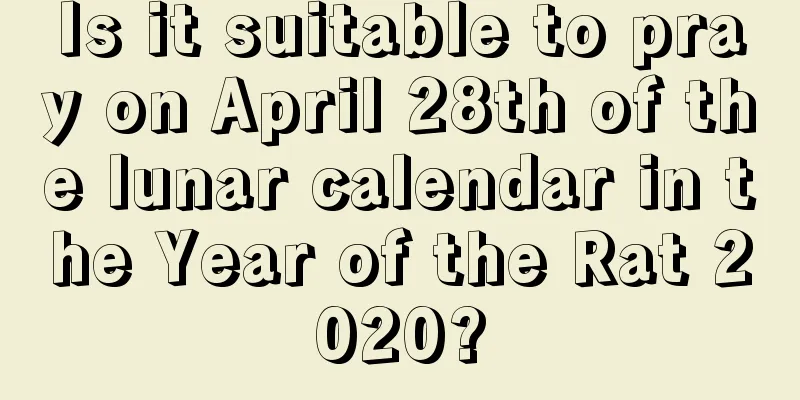What festival is on the sixth day of the Lunar New Year and what are the customs?

Introduction: The sixth day of the Chinese New Year is the sixth day of the new year. Six is an auspicious number, meaning "everything will go smoothly." Do you know what day the sixth day of the Lunar New Year is? What are the traditional folk customs and activities on this day? Next, please follow the editor to learn about it! In addition to the grand and festive celebrations of the Spring Festival, we also need to pay attention to some taboos regarding the Spring Festival. Next, let’s take a closer look at the Spring Festival special topic compiled by Mr. Shui Mo!2017 Lunar New Year Sixth Day Do's and Don'tsSuitable for: offering sacrifices, praying for blessings, seeking offspring, receiving livestock, coffining, starting a funeral, thanking the land, removing mourning clothes, and finishing mourning clothes. Unsuitable for: planting, opening a ceremony, traveling, acupuncture, getting married, moving into a new home, breaking ground, and breaking groundAnother name for the sixth day of the Lunar New Year: Horse Day, also known as Yifei in ancient timesGao Cheng, a writer in the Song Dynasty, wrote a book called "Shiwu Jiyuan", in which there is a passage describing the Spring Festival: "Dongfang Shuo's "Zhanshu" says: on the first day of the first month of the year, it is the chicken, on the second day it is the dog, on the third day it is the sheep, on the fourth day it is the pig, on the fifth day it is the cow, on the sixth day it is the horse, on the seventh day it is the human, and on the eighth day it is the grain." The introduction also mentioned that Nuwa created animals and humans in seven days, and created the horse on the sixth day, so the sixth day of the Lunar New Year is also called Horse Day.What are the customs on the sixth day of the Lunar New Year?Custom 1: Sending away povertyFrom the first to the seventh day of the Chinese New Year, different places have different customs during these seven days. However, no matter how many customs there are in different places, there is always one custom as the theme. The theme custom of the sixth day of the Lunar New Year is "sending away poverty".On this day, the Han Chinese custom includes "going to the fields to prepare for spring plowing and sending away the poor spirit." In the old days, farmers started going to the fields on this day to prepare for spring ploughing. In some places, people "send away poverty" on this day, which means sending away the "poor ghost". The custom of sending away the poor is recorded in "Miscellaneous Notes on the Sui Shi": "One day before the New Year's Day, people sweep up dung on a broom. Before people leave, they cover the dung with seven pancakes and throw them on the main road to send away the poor." Han Yu's "Sending Away the Poor" mentioned that one should "tie willow branches into a cart and raise a sail to the wall" for the poor ghost. This means that when sending away the poor, one should prepare a symbolic cart and boat for the "poor ghost" and also bring some dry food for the "poor ghost." In some places, there is a practice of "sending away poverty with banana boats". In modern times, the methods of sending away poverty actually vary from place to place. Take Beijing as an example. Originally, the God of Poverty was a female, who was said to be Jiang Ziya's wife. In order to prevent the ghost of poverty from entering their homes during the Spring Festival, people hung red notes on their doors to ward off her. But at some point, Beijing's God of Poverty became a male, and he became the god worshipped by porters. On this day, housewives of the house have to throw out the garbage accumulated during the festival, which is called sending away the ghost of poverty. The hanging notes on the door can also be taken down and thrown out at the same time, which is called sending away the god of poverty. Custom 2: Opening of the MarketSetting off firecrackers is indispensable for the opening of a market. In the old days, on the day when large and small businesses "opened for business", a big red couplet with the words "Good luck in the opening of business, everything will go well" would be posted on the door panels. Firecrackers are set off before opening to bring good luck. Some families find a "complete person" (a woman with a husband, children, and parents-in-law) to go around each room and say auspicious words before opening the market on the sixth day of the Lunar New Year, such as "good luck in opening the market, more than enough blessings, everything will be safe, make more money, and earn enough gold and silver to fill a kang", etc. Before the market opens, it is taboo for women from other families to visit one's home. After the market opens, all Spring Festival taboos end, everything returns to normal, and neighbors can resume visiting and interacting with each other.Custom 3: FertilizerPeople in many places believe that this is the day when they really start working or doing business. Since the beginning of the first month of the lunar year, the toilet cannot be cleaned until the fifth day, and feces accumulate in the toilet. So on this day, a thorough cleaning is done, and sacrifices are made to the toilet god to clean the usually dirty toilet. That’s why it’s called “挹肥” (but nowadays most families use new bathroom equipment, so this custom no longer exists). This day also represents the day when farmers in the old days began to go to the fields to prepare for spring ploughing.Summary: The above article provides us with a detailed analysis of the customs and taboos on the sixth day of the Lunar New Year. I hope everyone can understand it. Finally, the editor wishes all readers good luck and good fortune in the new year! After reading this article, there are more exciting content in the Spring Festival special topic, let’s take a look! |
<<: The eighth day of the first lunar month is Gu Zi’s birthday. What are the customs and habits?
Recommend
Is it appropriate to install the bed on March 25th of the lunar calendar in 2020? How to choose an auspicious day and time for installing the bed?
Introduction: Setting up the bed is as important a...
What zodiac sign will a baby born during the Beginning of Summer in 2020 belong to?
Date table of the twelve zodiac signs. In Western ...
Is it good for a boy to be born on the 12th day of February 2020? What is the zodiac sign for those born on the 12th day of February 2020?
Introduction: Every day will have good and bad luc...
Is it a good idea to propose on the third day of the second lunar month in 2022?
I believe everyone is familiar with proposing, and...
Where is the God of Wealth on August 11, 2019?
Follow the time and feel the changes and differen...
Analysis of the fate of a baby boy born on December 16, 2021
The fate of a child is related to the time of his ...
Which month in the lunar calendar is the Cold Clothes Festival? What are the customs of Cold Clothes Festival?
The Cold Clothes Festival, also known as the "...
Analysis of the zodiac signs of children born on the 16th day of the 12th lunar month in 2021
Constellations are divided according to the Gregor...
Auspicious days for ancestor worship: Recommendations for auspicious days for ancestor worship in November of the lunar calendar in 2020!
Introduction: Generally, it is necessary to choose...
Query the location of the God of Wealth on the fourth day of the fifth lunar month in 2018
The Book of Songs records that “cicadas chirp in ...
Why do we do tricks on Halloween? What can you eat on Halloween?
Halloween is one of the traditional Western festiv...
Is May 22nd of the lunar calendar 2017 an auspicious day for renovation? Is decoration possible?
Introduction: Modern people pay more and more atte...
Can I put a fish tank in the entrance hall? What should you pay attention to when raising fish in the porch?
Introduction: The entrance hall refers to the oute...
What are the auspicious days for burial in September of the lunar calendar in 2017?
Introduction: Everyone will have their life come t...
Is May 24th of the lunar calendar in 2021 an auspicious day? Can the funeral be held there?
The fifth month of the lunar calendar, which is th...









